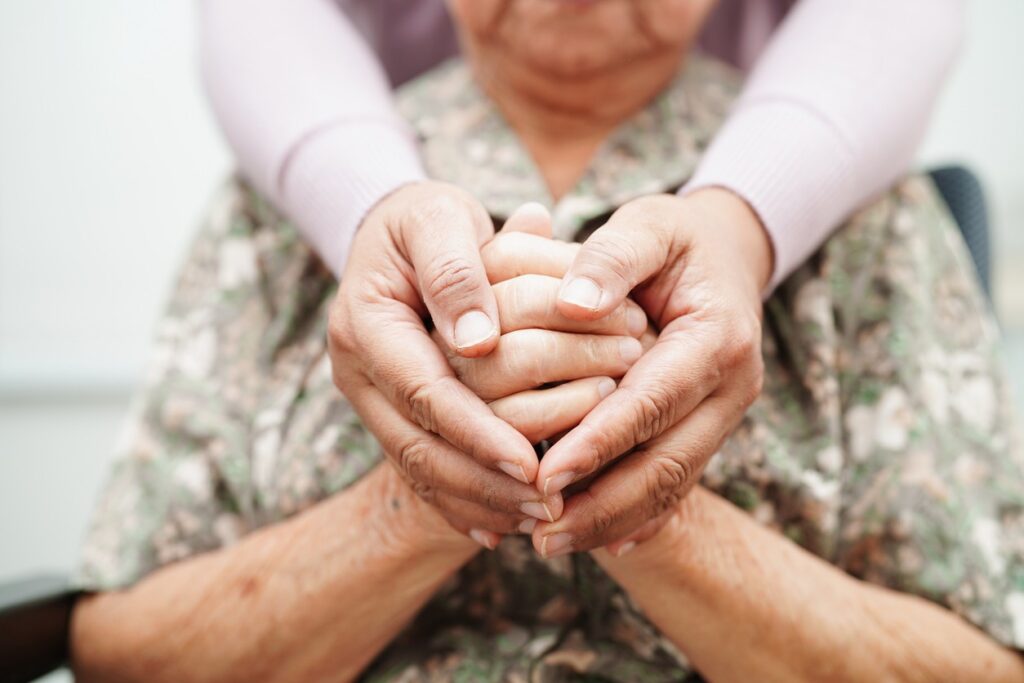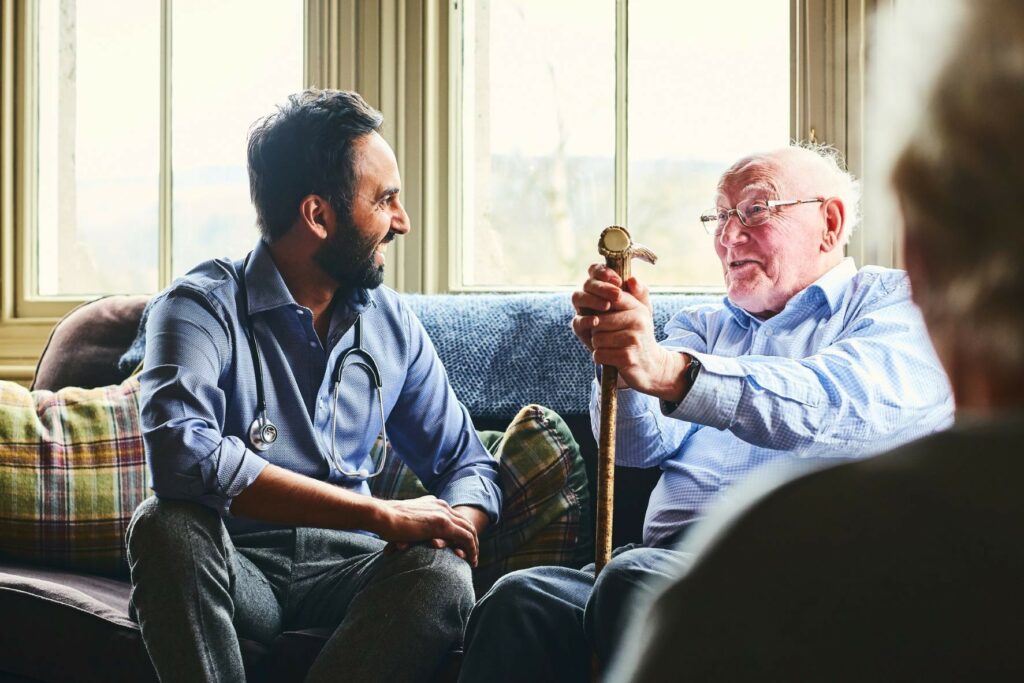Hospice care is not only about easing physical symptoms with medical care. It’s a holistic approach to honoring the whole person—their body, mind, heart, and spirit—during one of life’s most profound transitions. For individuals and families facing the end of life, spiritual and emotional care can bring comfort, healing, and peace that medicine alone cannot provide.
While every person’s journey is unique, many share common fears and longings at life’s end: the desire for comfort, the need to be heard, and the hope to leave behind a legacy of meaning and love. Addressing these needs helps patients feel valued and whole, while also supporting families through anticipatory grief and into healing.

Why Emotional and Spiritual Care Matters
Physical comfort is essential, but if emotional or spiritual distress goes unaddressed, the patient’s quality of life may still be diminished. In fact, research shows that spiritual and emotional well-being can affect pain management, anxiety, and overall peace of mind.
- Emotional support acknowledges feelings of fear, sadness, anger, or regret. It provides safe space for patients and families to express themselves without judgment.
- Spiritual care affirms meaning and connection—whether through religious traditions, personal beliefs, cultural practices, or simply the search for peace and acceptance.
Together, these dimensions of care reduce suffering, restore dignity, and allow people to focus on what matters most: relationships, reflection, and presence.
Common Emotional and Spiritual Needs in Hospice

Every person’s story is unique, but many hospice patients experience:
- Fear of the unknown: Worries about death, what comes after, or how loved ones will cope.
- Desire for reconciliation: A longing to resolve conflicts, express forgiveness, or repair relationships.
- Meaning-making: Reflecting on life, legacy, and the impact they’ve had on others.
- Need for connection: Wanting to feel seen, valued, and accompanied in their journey.
- Hope for comfort: Not necessarily for cure, but for peace, acceptance, and dignity.
Recognizing these emotional needs is the first step toward compassionate care.
How Hospice Teams Provide Support

At Partners In Care in Central Oregon, our hospice professionals embrace a team approach that weaves emotional and spiritual support into every aspect of end-of-life care.
- Chaplains and spiritual counselors: Offer support regardless of faith or tradition, guiding reflection, prayer, ritual, or simple presence.
- Social workers: Help patients and families navigate emotions, family dynamics, and practical concerns.
- Counselors and bereavement specialists: Provide coping tools during hospice and grief support after loss.
- Volunteers: Offer companionship, conversation, and presence that enrich daily life.
- Nurses and aides: Address not only physical comfort but also emotional reassurance at the bedside.
Practical Tips for Families and Caregivers

While professional support is essential, families also play a powerful role in nurturing emotional and spiritual wellbeing. Here are ways you can help:
1. Create Space for Honest Conversations
Encourage open sharing by asking gentle questions:
- “What has given your life the most meaning?”
- “Are there things you’d like to say or do?”
- “What brings you peace right now?”
Listening with compassion—without trying to “fix” or change—can be deeply healing.
2. Honor Beliefs and Traditions
Support the practices most meaningful to your loved one based on their spiritual beliefs: prayer, meditation, sacred texts, music, or cultural rituals. Even small gestures, like playing a favorite hymn or lighting a candle, can bring comfort.
3. Use Rituals to Mark Moments
Create rituals that affirm life and connection:
- Write letters or record messages for loved ones.
- Create a memory box or scrapbook.
- Share a meal with favorite foods.
- Hold a gratitude circle where everyone shares what they appreciate.
4. Encourage Life Review and Storytelling
Invite your loved one to share stories, wisdom, or lessons they wish to pass on. Recording or writing these down can be therapeutic for them and a cherished keepsake for the family.
5. Offer Comfort Through Compassionate Presence
Sometimes words aren’t necessary. Simply sitting quietly, holding a hand, or being fully present communicates love and reassurance.
6. Support Forgiveness and Reconciliation
Help facilitate conversations where apologies, forgiveness, or reconciliations can happen. These moments often bring profound peace.
7. Integrate Creative Expression
Encourage art, poetry, journaling, or music therapy as ways to process emotions and express spirit. Creative outlets can offer relief when words are hard to find.
8. Include Children and Teens
In age-appropriate ways, invite younger family members into the process. This helps them understand, grieve, and feel included.
9. Use Nature as a Healing Companion
If possible, spend time outdoors or bring elements of nature inside—flowers, fresh air, or the sound of water. Nature often provides a sense of peace and continuity.
10. Seek Out Grief Support Early
Grief often begins before the actual loss. Take advantage of counseling, support groups, or spiritual guidance during hospice—not only afterward.
The Role of Legacy Work
For many, leaving something behind provides meaning and comfort. Legacy work can take many forms:
- Writing letters to family members
- Recording life stories or lessons learned
- Creating photo albums or videos
- Sharing recipes, traditions, or values
- Planting a tree or making a charitable gift in their honor
Legacy projects help patients feel that their life has mattered and continues to have an impact.
Supporting Families Through Grief
Hospice services continue after death through bereavement services. Families may receive:
- One-on-one grief counseling
- Support groups for shared connection
- Memorial services or rituals to honor loved ones
- Resources for coping with anniversaries and milestones
This continued care recognizes that grief is a journey, and healing takes time.
How Communities Can Help
Caring for someone at the end of life is not just a family matter—it is a community responsibility. Communities can help by:
- Offering support groups and spiritual resources.
- Training volunteers to sit with patients and families.
- Reducing the stigma around conversations about death and dying.
- Sharing stories and resources to normalize emotional and spiritual care in hospice.
A Compassionate, Trusted Partner in Hospice Care
Addressing emotional and spiritual needs is not an optional extra in hospice—it is the very essence of holistic care. Patients and families deserve support that honors their fears, beliefs, hopes, and connections. Through listening, presence, ritual, storytelling, forgiveness, and legacy, hospice care helps people embrace life’s closing chapter with dignity, comfort, and peace.
In Central Oregon, Partners In Care has long been a trusted resource for compassionate hospice, palliative, and grief support. Our interdisciplinary teams—nurses, chaplains, counselors, social workers, and volunteers—are dedicated to honoring emotional and spiritual needs as central to quality of life. For those seeking guidance and support, our hospice providers offer not only medical expertise but also heartfelt presence and community.
If you are supporting a loved one in hospice, remember: you are not alone. Compassionate resources at Partners In Care—whether through hospice teams, chaplains, community groups—are here to walk with you every step of the way.

